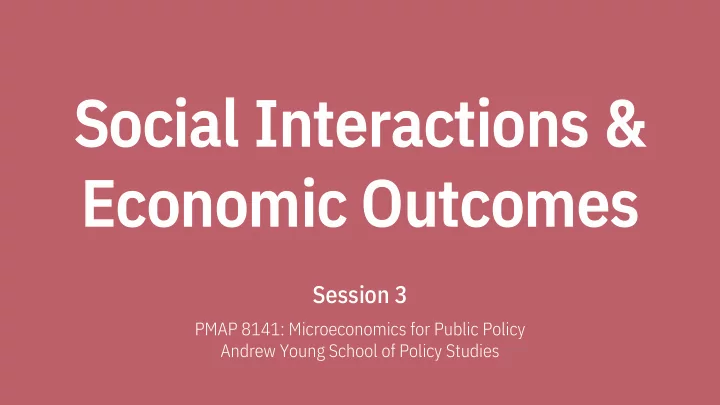

So Socia ial Int Inter eractio ions ns & Ec Economi onomic Out Outcome omes Session 3 PMAP 8141: Microeconomics for Public Policy Andrew Young School of Policy Studies
Plan for today Individuals and society Game theory Stags, hares, and prisoners Fixing collective action problems
Individuals and society
$4 for each red card you keep $1 to everyone for each red card in pool
Public goods Non-excludable Not possible to stop others from using the good Non-rivalrous One person using the good doesn’t prevent anyone else from using it
Group interests = public goods “The achievement of any common goal or the satisfaction of any common interest means that a public or collective good has been provided for that group” Mancur Olson, The Logic of Collective Action, p. 15 Free riding!
Micromotives and macrobehavior
Micromotives and macrobehavior Perfectly rational individual behavior can create irrational and inferior social outcomes Social dilemma Collective action problem
No man is an island, entire of itself; every man is a piece of the continent, a part of the main. If a clod be washed away by the sea, Europe is the less, as well as if a promontory were. as well as if a manor of thy friend’s or of thine own were. Any man’s death diminishes me, John Donne because I am involved in mankind; Meditation XVII and therefore never send to know for whom Devotions upon Emergent Occasions 1623 the bell tolls; it tolls for thee.
Game theory
Why do these un-fun “games”?!? “Economics is the study of how people interact with each other… in providing for their livelihoods” We need formal language + an analytical framework for looking at those interactions
Key vocabulary Game Model of strategic interaction Zero-sum Only one winner Non-zero-sum Both players can win; requires cooperation Pareto efficiency Outcome can’t be improved without hurting another player
Strategies Nash equilibrium Choice where no player has incentive to change Dominant Choice where you gain no matter what the other player does Pure Choice you make every time Mixed You gain or lose based on probabilities of other player’s choices
Payoffs The benefit an Bala actor gets from Rice Cassava the choice 1, 3 2, 2 Rice Anil Money, points, 4, 4 3, 1 Cassava utility, etc.
Invisible hand Bala Rice Cassava 1, 3 2, 2 Rice Anil 4, 4 3, 1 Cassava Non-zero-sum One dominant equilibrium
Bach or Stravinsky Friend 2 Chinese Italian 2, 1 0, 0 Friend 1 Chinese 0, 0 1, 2 Italian Non-zero-sum Two equilibria Mixed strategy
Chicken Racer 2 Keep going Swerve Keep − 100, − 100 5, − 5 Racer 1 going − 5, 5 0, 0 Swerve Non-zero-sum Two equilibria Mixed strategy
Prisoner’s dilemma Bala Magic bugs Poison Magic 3, 3 1, 4 bugs Anil 4, 1 2, 2 Poison Non-zero-sum One dominant equilibrium Not socially optimal!
Stags, hares, and prisoners
Cooperation in PD land Repetition + iteration Infinitization One-shot vs. repeated Defect at t − 1 PD games underpredict voluntary cooperation People cooperate even though the dominant strategy is always defect
Stag hunt Bala Hunt stag Hunt hare Hunt 10, 10 0, 2 stag Anil Hunt 2, 0 2, 2 hare Non-zero-sum Two pure equilibria Mixed strategy Not socially optimal!
Cooperation in stag hunt land The payoffs for cooperation are greater than the payoffs for defection There’s still an incentive to defect
Better model of social dilemmas Climate change Arriving on time Points in soccer tournaments Negative political campaigns
Fixing collective action problems
Perfectly rational individual behavior can create irrational and inferior social outcomes
What stops us from cooperating? Uneven payoffs Lack of assurance Dishonesty Selfishness These are all rational things that utility-maximizing people do!
How do we fix this? Altruism Repetition and iteration Infinitization Punishment Norms Institutions Public policy
Tragedy of the commons Farmer 2 Use water normally Double water use Use 6, 6 2, 8 Farmer 1 water normally Double 8, 2 3, 3 water use
Institutional fixes Change payoffs so that normal water use is more valuable Make water common property Privatize the water and let one person control it
Recommend
More recommend